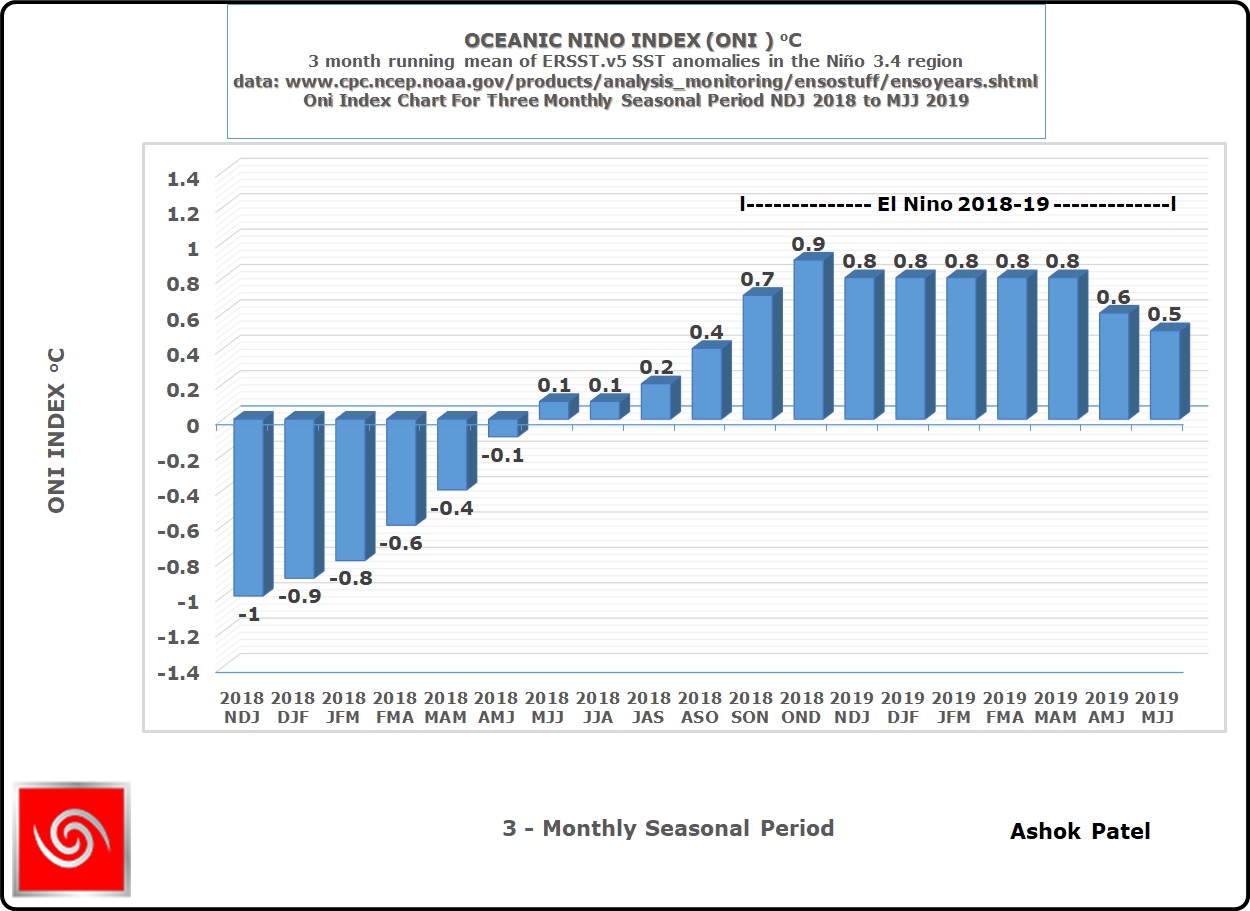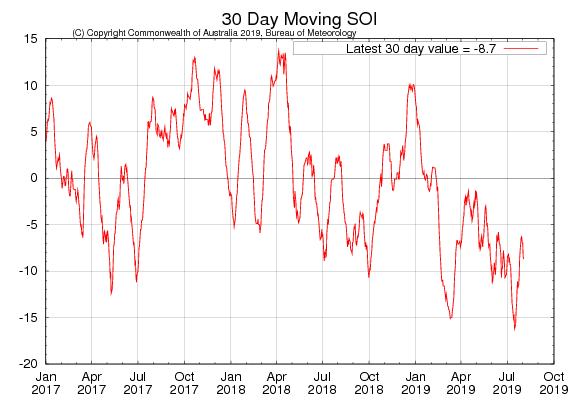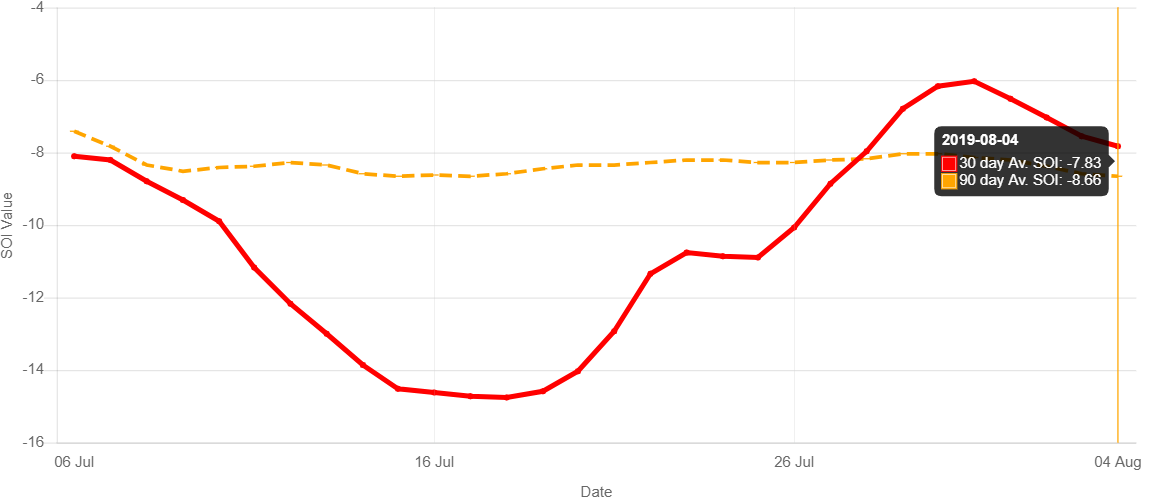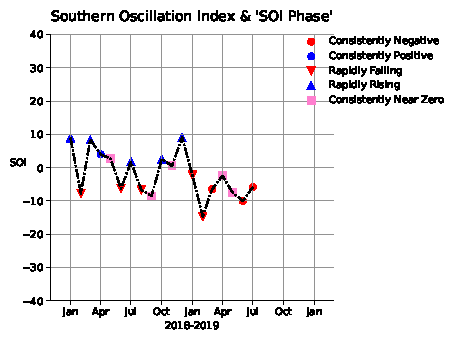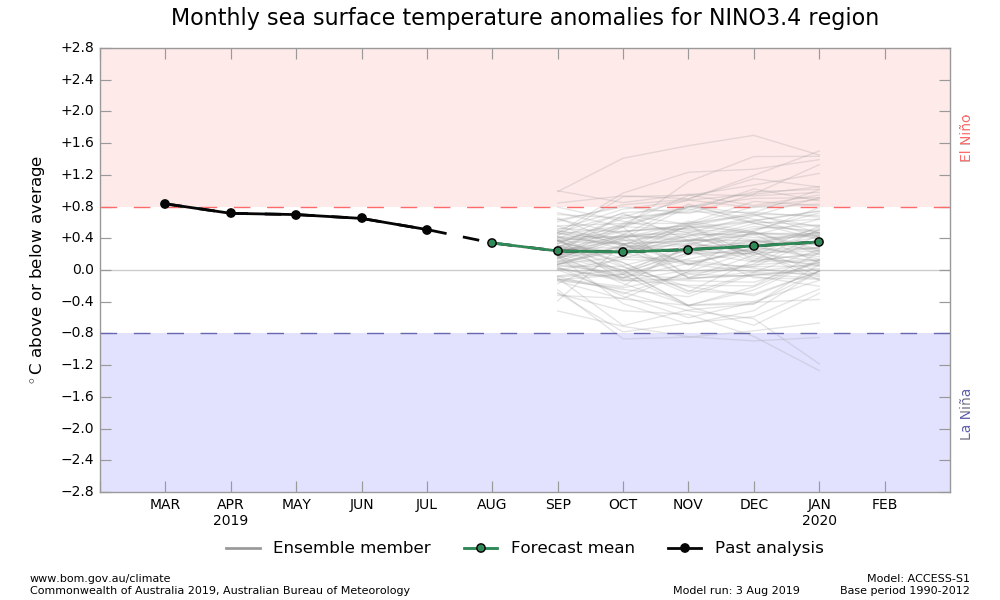Enso Status on 5th August 2019 – Updated 6th August 2019
Huge Deficit Of Southwest Monsoon Rainfall Recovers Although A Weak El Nino Exits With Latest MJJ ONI Index At +0.5ºC – Update 5th August 2019
Whole India huge Rainfall deficit has reduced to just 7% deficit from LPA.
JJA 2019 ONI ઈન્ડેક્સ +0.5ºC હોવાથી હજુ નબળો ‘એલ નિનો’ ચાલુ છે તેમ છતાં દક્ષિણ પશ્ચિમ ચોમાસા ની મોટી ખાદ્ય હતી તે ઓછી થઇ. ચોમાસા ના વરસાદ માં મોટી ઘટ હતી તે હાલ માં ફક્ત 7 % ઘટ રહી.
Ashok Patel’s Analysis & Commentary :
Using NOAA Criteria, a full-fledged El Nino event started at the end of March 2019 having fulfilled the five consecutive overlapping 3-monthly seasons with ONI greater than or equal to +0.5ºC. El Nino has continued for many months, July 2019 being the ninth 3-monthly season with MJJ 2019 at +0.5ºC. The last two Nino3.4 SST anomaly for June is +0.54ºC and July is +0.44ºC. If the Nino3.4 SST anomaly of August manages to go below 0.39ºC, the JJA ONI Index would be less than +0.5ºC, and thereby El Nino could transition into ENSO neutral conditions at the end of August 2019. However, if August Nino3.4 SST anomaly manages to remain at or above 0.39ºC, a weak El Nino will continue. The chances of El Nino ending at end of August 2019 is high.
Based on earlier more than 100 years weather Data for Indian Summer Monsoon, The Average Rainfall in an El Nino years is 94% of LPA while in La Nina Years it has been 106 % of LPA. El Nino or La Nina may affect the Monsoon differently for different Regions of India and the same is being researched for some concrete co-relations.
અશોક પટેલ નું તારણ અને વિશ્લેષણ :
NOAA માપદંડ મુજબ માર્ચ આખર માં વિધિવત ‘એલ નિનો’ ડિક્લેર થયેલ કારણ કે સળંગ 5 અંશતઃ ઢાંકેલ ત્રી-માસિક સીઝન નું ONI ઈન્ડેક્સ +0.5ºC અથવા વધુ રહેલ છે. નબળો ‘એલ નિનો’ ઘણા મહિના ઓ થયા ચાલુ છે જેમાં જુલાઈ 2019 માં નવમી 3-માસિક સીઝન એટલે કે MJJ 2019 નું ONI ઈન્ડેક્સ +0.5ºC રહેલ છે. છેલ્લા ત્રણ મહિના નું Nino3.4 SST ઍનોમલી જૂન +0.54ºC અને જુલાઈ +0.44ºC છે. જો ઓગસ્ટ 2019 નું Nino3.4 SST ઍનોમલી +0.39ºC થી નીચું રહે તો JJA 2019 નું ONI +0.5ºC થી નીચું રહે એટલે ‘એલ નિનો’ ખતમ થાય અને જો Nino3.4 SST ઍનોમલી +0.39ºC અથવા તેથી વધુ રહે તો ‘એલ નિનો’ ચાલુ રહે. હાલ ની પરિસ્થિતિ મુજબ ‘એલ નિનો’ ખતમ થવા ની શક્યતા વધુ છે.
આગળ ના 100 વર્ષ થી વધુ ની શરેરાશ પ્રમાણે એલ નિનો વર્ષ માં ભારતીય ચોમાસુ 94% રહેલ છે, જયારે લા નિના વર્ષ માં ચોમાસુ 106% રહેલ છે. ભારતીય ચોમાસા માટે વિવિદ્ધ પરિબળો પૈકી નું એલ નિનો/લા નિના ફક્ત એક પરિબળ છે. ભારત ના અલગ અલગ વિસ્તારો ના ચોમાસા પર એલ નિનો/લા નિના ની અસર એક સરખી નથી થતી, જે હાલ રિસર્ચ નો ઠોસ વિસય છે.
How ONI is determined:
The ONI is based on SST departures from average in the Niño 3.4 region, and is a principal measure for monitoring, assessing, and predicting ENSO. Defined as the three-month running-mean SST departures in the Niño 3.4 region. Departures are based on a set of further improved homogeneous historical SST analyses (Extended Reconstructed SST – ERSST.v5). Explanation about ERSST.v5 is given here.
NOAA Operational Definitions for El Niño and La Niña, El Niño: characterized by a positive ONI greater than or equal to +0.5ºC. La Niña: characterized by a negative ONI less than or equal to -0.5ºC. By historical standards, to be classified as a full-fledged El Niño or La Niña episode, these thresholds must be exceeded for a period of at least 5 consecutive overlapping 3-month seasons.
CPC considers El Niño or La Niña conditions to occur when the monthly Niño3.4 OISST departures meet or exceed +/- 0.5ºC along with consistent atmospheric features. These anomalies must also be forecast to persist for 3 consecutive months.
The Climate Prediction Center (CPC) is a United States Federal Agency that is one of the NECP, which are a part of the NOAA
Current El Nino 2018-19 all ONI Index are SON 2018 +0.7ºC, OND 2018 +0.9ºC, NDJ 2019 +0.8ºC, DJF 2019 +0.8ºC, JFM 2019 +0.8ºC, FMA 2019 +0.8ºC, MAM 2019 +0.8ºC, AMJ 2019 +0.6ºC and MJJ 2019 +0.5ºC. Last three Nino 3.4 SST anomaly are May +0.65ºC, June +0.54ºC and July is +0.44ºC.
Latest Oceanic Nino Index Graph Shows El Nino 2018-19
Exists End Of July 2019
The Table below shows the monthly SST of Nino3.4 Region and the Climate adjusted normal SST and SST anomaly for last two years. Climate Base 1986-2015. ERSST.v5
Period Nino3.4 ClimAdjust YR MON Temp.ºC Temp.ºC ANOM ºC 2017 8 26.70 26.91 -0.21 2017 9 26.29 26.80 -0.51 2017 10 26.15 26.75 -0.60 2017 11 25.74 26.75 -1.01 2017 12 25.62 26.65 -1.04 2018 1 25.58 26.45 -0.88 2018 2 25.98 26.66 -0.68 2018 3 26.50 27.21 -0.71 2018 4 27.32 27.73 -0.41 2018 5 27.74 27.85 -0.11 2018 6 27.76 27.65 0.13 2018 7 27.42 27.26 0.16 2018 8 26.94 26.91 0.04 2018 9 27.19 26.80 0.39 2018 10 27.62 26.75 0.86 2018 11 27.61 26.75 0.86 2018 12 27.49 26.65 0.84 2019 1 27.21 26.45 0.76 2019 2 27.49 26.66 0.82 2019 3 28.11 27.21 0.90 2019 4 28.46 27.73 0.72 2019 5 28.50 27.85 0.65 2019 6 28.19 27.65 0.54 2019 7 27.70 27.26 0.44
Southern Oscillation Index
As per BOM, Australia:
The 30-day Southern Oscillation Index (SOI) to 3rd August 2019 was -8.7 and is considered in the El Nino zone.
Sustained negative values of the SOI below −7 typically indicate El Niño while sustained positive values above +7 typically indicate La Niña. Values between +7 and −7 generally indicate neutral conditions.
Recent (preliminary) Southern Oscillation Index values as per The Long Paddock – Queensland Government.
30 Days average SOI was -6.02 at the end of July 2019 and was -7.83 on 4th August 2019 as per The Long Paddock – Queensland Government and 90 Days average SOI was -8.66
SOI 30 Days & 90 Days graph up to 4th August 2019 as per The Long Paddock – Queensland Government.
SOI Monthly graph up to July 2019 as per The Long Paddock – Queensland Government.
Summary by: Climate Prediction Center / NCEP Dated 29th April 2019
ENSO Alert System Status: El Niño Advisory
El Niño is present.*
Equatorial sea surface temperatures (SSTs) are above average across most of the Pacific Ocean. The pattern of anomalous convection and winds are generally consistent with El Niño. A transition from El Niño to ENSO-neutral is expected in the next month or two, with ENSO-neutral most likely to continue through the Northern Hemisphere fall and winter.*
* Note: These statements are updated once a month (2nd Thursday of each month) in association
with the ENSO Diagnostics Discussion, which can be found by clicking here.
As per BOM – Australia 6th August 2019
ENSO outlooks
All eight surveyed international climate models indicate central tropical Pacific sea surface temperatures in the NINO3.4 region will remain at ENSO-neutral levels at least until the end of 2019.
(Note: winter/spring is with reference to Southern Hemisphere)
Earlier updates are listed below:
Click here for Update “El Nino 2018-19 Episode To Continue Into May 2019”
Click here for Update “El Nino Expected To Be Declared End Of March 2019”
Click here for Update “Much Hyped El Nino Has Not And Will Not Materialize During Indian Summer Monsoon 2018 “
Click here for Update “ENSO Neutral Conditions Prevail July 2018”
Click here for Update “Full-fledged El Nino Ruled Out During Southwest Monsoon 2018”
Click here for Update “Weak La Nina Exists Till The End Of April 2018”
Click here for Update “Full Fledged La Nina Event Has Developed At The End Of March 2018”
